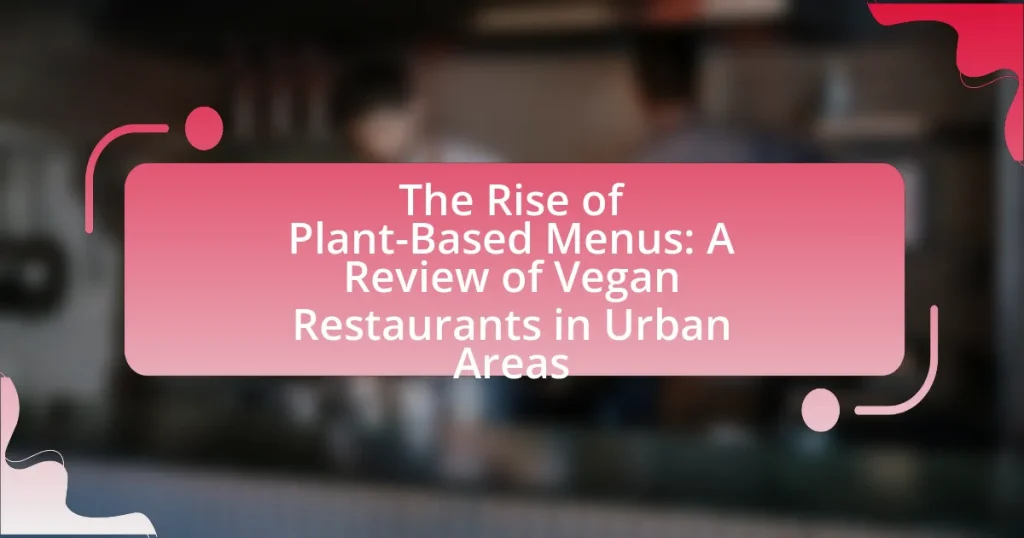The article examines the significant influence of celebrity chefs on the culinary world, particularly through their signature restaurants. It explores how these chefs shape dining trends, consumer preferences, and food culture, while also highlighting the role of media in enhancing their visibility. Key characteristics of signature restaurants, including unique culinary techniques and the importance of ambiance, are discussed, along with the economic impact these establishments have on local communities. Additionally, the article addresses the challenges celebrity chefs face in maintaining quality and managing customer expectations, providing insights into best practices for aspiring chefs looking to establish their own culinary brands.

What is the Influence of Celebrity Chefs on the Culinary World?
Celebrity chefs significantly influence the culinary world by shaping food trends, elevating culinary standards, and enhancing public interest in gastronomy. Their television appearances and social media presence popularize specific cuisines and cooking techniques, making gourmet food more accessible to the general public. For instance, chefs like Gordon Ramsay and Julia Child have transformed home cooking by introducing complex recipes in a simplified manner, leading to increased culinary experimentation among home cooks. Additionally, celebrity chefs often establish signature restaurants that set industry benchmarks for quality and innovation, as seen with Wolfgang Puck’s Spago, which pioneered the concept of fine dining with a casual atmosphere. This influence is further evidenced by the rise of food-related television programming, which has grown to a multi-billion dollar industry, reflecting the public’s fascination with culinary arts and the personalities behind them.
How do celebrity chefs shape dining trends and consumer preferences?
Celebrity chefs shape dining trends and consumer preferences by leveraging their public personas and culinary expertise to influence what consumers seek in dining experiences. Their television appearances, social media presence, and cookbooks create a strong brand identity that resonates with audiences, leading to increased interest in specific cuisines, cooking techniques, and dining styles. For instance, the rise of farm-to-table dining can be attributed to chefs like Alice Waters, who popularized the concept through her restaurant, Chez Panisse, emphasizing local and sustainable ingredients. This shift has been supported by consumer demand for healthier and more environmentally conscious dining options, as evidenced by a 2019 survey from the National Restaurant Association, which found that 70% of consumers are more likely to visit restaurants that prioritize sustainability. Thus, celebrity chefs not only introduce new culinary trends but also align them with evolving consumer values, effectively shaping the dining landscape.
What role does media play in enhancing the visibility of celebrity chefs?
Media plays a crucial role in enhancing the visibility of celebrity chefs by providing platforms for exposure through television shows, social media, and online content. Television cooking shows, such as “Top Chef” and “MasterChef,” showcase chefs’ skills and personalities, significantly increasing their public recognition. Social media platforms like Instagram and TikTok allow chefs to share their culinary creations and engage directly with audiences, further amplifying their reach. According to a 2021 survey by the National Restaurant Association, 70% of consumers reported being influenced by social media when choosing where to dine, highlighting the impact of media on consumer behavior and chef visibility.
How do celebrity chefs influence food culture and gastronomy?
Celebrity chefs significantly influence food culture and gastronomy by popularizing culinary trends and elevating the status of cooking as an art form. Their television shows, cookbooks, and social media presence introduce innovative techniques and diverse cuisines to a broad audience, shaping public tastes and dining habits. For instance, chefs like Gordon Ramsay and Jamie Oliver have made gourmet cooking accessible, inspiring home cooks to experiment with new ingredients and recipes. Additionally, celebrity chefs often advocate for sustainable practices and local sourcing, impacting consumer behavior and restaurant industry standards. Their influence is evident in the rise of food-related media and the increasing popularity of dining experiences that emphasize creativity and presentation.
Why are signature restaurants significant in a celebrity chef’s career?
Signature restaurants are significant in a celebrity chef’s career because they serve as a tangible representation of their culinary brand and expertise. These establishments allow chefs to showcase their unique cooking styles, creativity, and personal culinary philosophies, which can enhance their reputation and visibility in the industry. For instance, chefs like Gordon Ramsay and Wolfgang Puck have built successful empires through their signature restaurants, which not only attract diners but also generate substantial revenue and media attention. The success of these restaurants often leads to increased opportunities, such as television appearances, cookbooks, and endorsements, further solidifying the chef’s status as a culinary authority.
What defines a signature restaurant in the context of celebrity chefs?
A signature restaurant in the context of celebrity chefs is defined by its unique culinary style and branding that reflects the chef’s personal identity and culinary philosophy. These establishments often feature a distinctive menu that showcases the chef’s signature dishes, which are typically innovative and representative of their culinary expertise. For instance, celebrity chefs like Gordon Ramsay and Wolfgang Puck have established restaurants that not only highlight their individual cooking techniques but also create a dining experience that aligns with their public persona. This connection between the chef and the restaurant enhances brand recognition and attracts patrons seeking an authentic experience tied to the chef’s reputation.
How do signature restaurants reflect the personal brand of a chef?
Signature restaurants reflect the personal brand of a chef by embodying their culinary philosophy, style, and unique identity. These establishments often showcase the chef’s signature dishes, which highlight their creativity and expertise, thus reinforcing their reputation in the culinary world. For instance, chefs like Gordon Ramsay and Thomas Keller have established restaurants that not only serve their distinctive cuisine but also reflect their personal values, such as quality, innovation, and attention to detail. The ambiance, menu design, and overall dining experience are curated to align with the chef’s vision, further solidifying their brand. This alignment is evident in the consistent themes and flavors that resonate with the chef’s public persona, making the restaurant an extension of their identity.
What impact do celebrity chefs have on local economies?
Celebrity chefs significantly boost local economies by attracting tourism, creating jobs, and increasing local spending. Their restaurants often become destinations, drawing food enthusiasts who contribute to the hospitality sector, including hotels and local attractions. For instance, a study by the National Restaurant Association found that celebrity chef restaurants can increase foot traffic in surrounding areas by up to 30%, leading to higher sales for nearby businesses. Additionally, these chefs often source ingredients locally, which supports local farmers and suppliers, further enhancing economic growth within the community.
How do signature restaurants contribute to job creation in their communities?
Signature restaurants contribute to job creation in their communities by employing a diverse workforce, including chefs, servers, and support staff. These establishments often require a significant number of employees to operate effectively, leading to direct job opportunities. For instance, a study by the National Restaurant Association indicates that the restaurant industry employs over 15 million people in the United States, with many of these jobs stemming from signature restaurants that attract both local patrons and tourists. Additionally, signature restaurants can stimulate local economies by sourcing ingredients from nearby farms and suppliers, further enhancing job creation in related sectors.
What are the economic benefits of celebrity chef restaurants for local suppliers?
Celebrity chef restaurants provide significant economic benefits for local suppliers by creating a demand for high-quality, locally sourced ingredients. This demand often leads to increased sales for local farmers and producers, as celebrity chefs prioritize fresh, regional products to enhance their culinary offerings. For instance, a study by the National Restaurant Association found that restaurants focusing on local sourcing can boost local economies by up to 30%, as they keep money circulating within the community. Additionally, celebrity chefs often collaborate with local suppliers, fostering long-term relationships that can lead to stable revenue streams for these businesses.

What are the Key Characteristics of Signature Restaurants?
Signature restaurants are characterized by their unique culinary identity, often defined by a distinctive menu that reflects the chef’s personal style and creativity. These establishments typically emphasize high-quality ingredients, innovative cooking techniques, and a strong focus on presentation, which collectively create a memorable dining experience. Additionally, signature restaurants often feature a specific ambiance or theme that aligns with the chef’s vision, enhancing the overall atmosphere. The influence of celebrity chefs is evident in their ability to attract a loyal customer base, driven by their reputation and culinary expertise, which further solidifies the restaurant’s brand identity.
How do menu offerings differentiate signature restaurants from others?
Menu offerings differentiate signature restaurants from others by featuring unique, innovative dishes that reflect the chef’s personal style and culinary philosophy. Signature restaurants often emphasize high-quality, locally sourced ingredients and distinctive flavor profiles that are not commonly found in standard dining establishments. For example, celebrity chefs like Thomas Keller and Gordon Ramsay create menus that showcase their signature techniques and recipes, elevating the dining experience. This focus on originality and craftsmanship not only sets these restaurants apart but also attracts diners seeking a memorable culinary experience.
What unique culinary techniques are often showcased in these restaurants?
Unique culinary techniques often showcased in celebrity chefs’ restaurants include molecular gastronomy, sous-vide cooking, and fermentation. Molecular gastronomy involves using scientific principles to create innovative textures and flavors, such as foams and gels, which enhance the dining experience. Sous-vide cooking entails vacuum-sealing food and cooking it at precise temperatures, resulting in perfectly cooked dishes with enhanced flavors. Fermentation, a traditional technique, is utilized to develop complex flavors in ingredients like vegetables and dairy, contributing to unique dishes that reflect the chef’s creativity and culinary philosophy. These techniques not only elevate the food but also demonstrate the chefs’ commitment to pushing culinary boundaries.
How do signature dishes reflect the chef’s personal style and philosophy?
Signature dishes embody a chef’s personal style and philosophy by showcasing their unique culinary techniques, flavor preferences, and cultural influences. For instance, a chef who emphasizes sustainability may create signature dishes that highlight locally sourced ingredients, reflecting their commitment to environmental responsibility. Additionally, the presentation and complexity of these dishes often reveal the chef’s artistic vision and technical skills, as seen in the intricate plating styles of renowned chefs like Thomas Keller or Grant Achatz. These elements collectively communicate the chef’s culinary identity and values, making signature dishes a direct expression of their personal and professional ethos.
What role does ambiance play in the success of a signature restaurant?
Ambiance plays a crucial role in the success of a signature restaurant by creating an inviting atmosphere that enhances the dining experience. A well-designed ambiance can influence customer perceptions, making them feel more comfortable and engaged, which often leads to longer visits and increased spending. Research indicates that 60% of diners consider ambiance a key factor in their overall satisfaction, highlighting its importance in attracting and retaining customers. Additionally, a unique ambiance can differentiate a signature restaurant from competitors, reinforcing its brand identity and appeal.
How do design and decor choices enhance the dining experience?
Design and decor choices significantly enhance the dining experience by creating an atmosphere that complements the culinary offerings. A well-thought-out design can evoke specific emotions, influence diners’ perceptions of food quality, and enhance overall enjoyment. For instance, research indicates that ambient factors such as lighting, color schemes, and furniture arrangement can affect diners’ mood and appetite, leading to increased satisfaction. A study published in the Journal of Consumer Research found that restaurants with aesthetically pleasing decor can elevate the perceived value of the meal, encouraging customers to spend more. Therefore, effective design and decor not only create a visually appealing environment but also play a crucial role in shaping the overall dining experience.
What atmosphere do celebrity chefs aim to create in their restaurants?
Celebrity chefs aim to create a vibrant and engaging atmosphere in their restaurants that enhances the dining experience. This atmosphere often includes elements such as open kitchens, interactive dining, and a focus on high-quality ingredients, which fosters a connection between the chef and the guests. For instance, many celebrity chefs incorporate design elements that reflect their culinary philosophy, such as rustic decor for farm-to-table concepts or sleek, modern aesthetics for fine dining. This intentional ambiance not only showcases their culinary artistry but also encourages a sense of community and excitement among diners, making the meal memorable.
How do celebrity chefs leverage social media for their restaurants?
Celebrity chefs leverage social media to enhance visibility and engagement for their restaurants by sharing visually appealing content, promoting special events, and interacting with followers. They utilize platforms like Instagram and Facebook to post high-quality images of dishes, behind-the-scenes videos, and live cooking demonstrations, which attract potential customers and create a personal connection. For instance, a study by the Journal of Hospitality and Tourism Technology found that 70% of consumers are influenced by social media when choosing a restaurant, highlighting the effectiveness of these strategies. Additionally, celebrity chefs often collaborate with influencers and utilize targeted advertising to reach broader audiences, further driving traffic to their establishments.
What strategies do they use to engage with their audience online?
Celebrity chefs engage with their audience online through interactive social media content, live cooking demonstrations, and personalized communication. They utilize platforms like Instagram and Facebook to share visually appealing food images and videos, which attract and retain followers. Additionally, many celebrity chefs host live Q&A sessions or cooking classes, allowing real-time interaction and fostering a sense of community. They also respond to comments and messages, creating a more personal connection with their audience. This strategy is supported by data showing that brands with high engagement rates on social media see a 20-40% increase in customer loyalty.
How does social media influence customer expectations and restaurant success?
Social media significantly influences customer expectations and restaurant success by shaping perceptions and providing immediate access to information. Customers often rely on platforms like Instagram and Facebook to view food presentations, read reviews, and engage with restaurant brands, which sets high expectations for quality and service. A study by the National Restaurant Association found that 70% of consumers are influenced by social media when deciding where to eat, indicating that a strong online presence can directly impact foot traffic and sales. Additionally, restaurants that actively engage with customers on social media can foster loyalty and enhance their reputation, leading to increased success in a competitive market.

What are the Challenges Faced by Celebrity Chefs in Running Signature Restaurants?
Celebrity chefs face several challenges in running signature restaurants, including maintaining consistent quality, managing high customer expectations, and balancing personal branding with operational demands. Consistent quality is crucial, as fluctuations can lead to negative reviews and loss of reputation; for instance, a study by the Cornell University School of Hotel Administration found that 80% of diners are influenced by online reviews. High customer expectations arise from the celebrity status of the chefs, which can create pressure to deliver exceptional dining experiences consistently. Additionally, celebrity chefs often struggle to balance their personal brand with the day-to-day operations of the restaurant, leading to potential conflicts between their public persona and the realities of restaurant management.
What operational challenges do celebrity chefs encounter?
Celebrity chefs encounter several operational challenges, including high customer expectations, staffing issues, and maintaining consistent quality. High customer expectations arise from their public personas, leading diners to anticipate exceptional service and innovative dishes. Staffing issues often stem from the competitive nature of the culinary industry, making it difficult to recruit and retain skilled employees. Maintaining consistent quality is crucial, as fluctuations in ingredient availability and kitchen performance can impact the overall dining experience. These challenges are compounded by the need for effective marketing and brand management, which are essential for sustaining their restaurant’s reputation in a crowded market.
How do staffing issues affect the quality of service in signature restaurants?
Staffing issues significantly degrade the quality of service in signature restaurants. When restaurants experience high turnover rates or insufficient staffing, it leads to longer wait times, decreased customer satisfaction, and a decline in service consistency. For instance, a study by the National Restaurant Association found that 75% of restaurant operators reported difficulty in finding qualified staff, which directly impacts service efficiency and guest experience. Additionally, inadequate training due to staffing shortages can result in errors in order fulfillment and a lack of knowledge about menu items, further diminishing the overall dining experience.
What are the financial risks associated with opening a signature restaurant?
Opening a signature restaurant involves several financial risks, including high startup costs, fluctuating food and labor expenses, and potential market saturation. High startup costs can exceed $500,000, which includes expenses for leasing, renovations, equipment, and initial inventory. Fluctuating food and labor costs can significantly impact profit margins; for instance, food prices can vary by as much as 20% annually due to supply chain issues. Additionally, market saturation in popular dining areas can lead to increased competition, making it difficult for new establishments to attract customers and achieve profitability. According to a study by the National Restaurant Association, approximately 60% of new restaurants fail within the first year, highlighting the financial risks associated with this venture.
How do celebrity chefs maintain their culinary standards?
Celebrity chefs maintain their culinary standards through rigorous training, consistent quality control, and a strong emphasis on sourcing high-quality ingredients. They often undergo formal culinary education and gain extensive experience in various kitchens, which equips them with the skills necessary to uphold high standards. Additionally, many celebrity chefs implement strict quality control measures in their restaurants, regularly tasting dishes and overseeing kitchen operations to ensure consistency. They also prioritize sourcing fresh, local, and sustainable ingredients, which not only enhances flavor but also aligns with current culinary trends and consumer preferences. This commitment to quality is evident in the success of their restaurants, often reflected in accolades such as Michelin stars or high ratings from culinary critics.
What systems do they implement to ensure consistency in food quality?
Celebrity chefs implement standardized recipes and rigorous training programs to ensure consistency in food quality. Standardized recipes provide precise measurements and cooking techniques, which help maintain uniformity across dishes. Additionally, comprehensive training programs for kitchen staff reinforce these standards, ensuring that all team members are skilled in the same methods and practices. This approach is supported by industry research indicating that consistency in food preparation leads to higher customer satisfaction and repeat business, as seen in successful restaurants like those of Gordon Ramsay and Wolfgang Puck.
How do they balance creativity with customer expectations?
Celebrity chefs balance creativity with customer expectations by incorporating innovative culinary techniques while ensuring the menu aligns with popular tastes. They often conduct market research and gather customer feedback to understand preferences, allowing them to create dishes that are both unique and appealing. For instance, chefs like Gordon Ramsay and Wolfgang Puck frequently adapt traditional recipes with modern twists, which not only showcases their creativity but also meets the expectations of a diverse clientele. This approach is supported by the fact that successful restaurants often see higher customer satisfaction ratings when they blend originality with familiar flavors, demonstrating that understanding customer desires is crucial for culinary innovation.
What strategies can aspiring chefs learn from successful celebrity chefs?
Aspiring chefs can learn several key strategies from successful celebrity chefs, including the importance of personal branding, culinary innovation, and effective networking. Personal branding is crucial, as celebrity chefs like Gordon Ramsay and Rachael Ray have built recognizable identities that resonate with audiences, allowing them to leverage their fame into successful restaurant ventures and media appearances. Culinary innovation is another vital strategy; chefs such as Thomas Keller emphasize the need for creativity and unique flavor combinations to stand out in a competitive market. Effective networking is also essential, as many celebrity chefs, including Wolfgang Puck, have cultivated relationships within the industry that open doors to collaborations and opportunities. These strategies demonstrate how aspiring chefs can enhance their careers by focusing on branding, innovation, and connections.
How can they build their personal brand in the culinary industry?
To build a personal brand in the culinary industry, chefs should focus on creating a unique culinary identity that reflects their style and values. This can be achieved by consistently showcasing their signature dishes through various platforms, such as social media, cooking shows, and food blogs. For instance, celebrity chefs like Gordon Ramsay and Ina Garten have successfully built their brands by leveraging television appearances and engaging content that highlights their culinary expertise and personality. Additionally, establishing a strong online presence through visually appealing content and interactive engagement with followers can enhance brand recognition. According to a study by the Culinary Institute of America, chefs who actively engage with their audience online see a 30% increase in brand loyalty.
What best practices should they follow when opening their own restaurants?
When opening their own restaurants, aspiring restaurateurs should prioritize thorough market research to understand customer preferences and competition. This foundational step enables them to identify a unique selling proposition, which is crucial for attracting a loyal customer base. Additionally, developing a comprehensive business plan that outlines financial projections, marketing strategies, and operational procedures is essential for guiding the restaurant’s launch and growth.
Furthermore, selecting a strategic location can significantly impact foot traffic and visibility, making it a critical factor in the restaurant’s success. Implementing effective staff training programs ensures high service standards, which can enhance customer satisfaction and retention. Lastly, leveraging social media and digital marketing can help build brand awareness and engage with potential customers, as evidenced by the fact that 70% of consumers are influenced by social media when making dining decisions.












